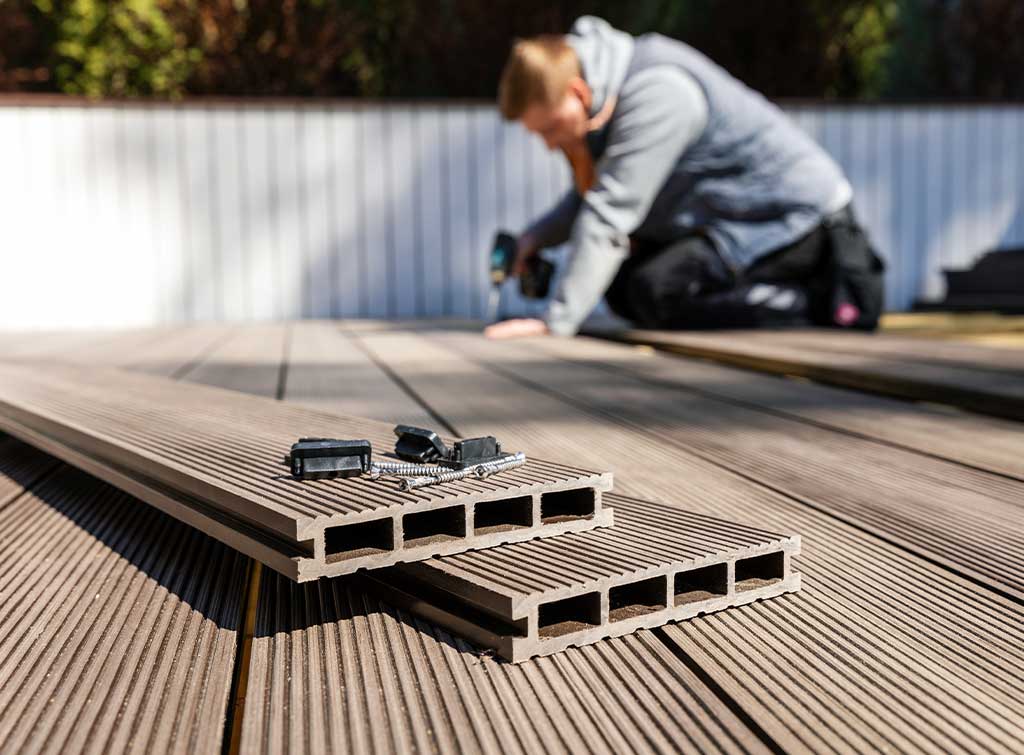Choosing the right materials is essential when preparing for your deck installation project.
Choosing the right materials is essential when preparing for your deck installation project.
Blog Article
How to Select the Right Materials for Your Deck Setup Task
Selecting the proper products for your deck installation task can appear complicated. The key is to stabilize your budget plan, layout choices, and way of life requires to produce a deck that will boost your outside space for years to come.
Recognizing the Different Kinds of Deck Products
When embarking on a deck setup job, the option of products becomes a pivotal choice. Various options are readily available, each with special qualities and aesthetic appeal. Conventional wood, for instance, uses a timeless, natural appearance and is commonly much more economical. Nonetheless, it can warp gradually and needs routine maintenance. Composite materials, on the other hand, are a mix of timber and plastic, giving durability and resistance to weather elements. They demand less upkeep contrasted to timber yet are usually a lot more costly. One more alternative is plastic, which is essentially maintenance-free and resistant to insects and rot, albeit less natural-looking. By recognizing these differences, home owners can make an extra educated decision on one of the most appropriate deck product for their particular demands.
Assessing the Sturdiness and Upkeep Requirements of Deck Materials
Analyzing the longevity and maintenance needs of deck products is an essential action in deck installment. Durability includes the product's ability to endure severe weather problems, damage, and its durability. Cedar and redwood are normally resistant to rot and bugs, making them durable options. On the various other hand, pressure-treated wood, while long lasting, might require more upkeep because of its sensitivity to splitting and warping.
Understanding maintenance needs is just as essential. Some products call for normal sealing or tarnishing to maintain their look and stand up to wetness damage, while others, like composite decking, demand much less upkeep. By assessing these variables, one can choose one of the most suitable outdoor decking material, making certain a balance in between longevity, maintenance requirements, and visual allure.
Price Evaluation: Comparing Timber and Composite Decking
Although expense may at first seem like an additional problem, it is a substantial element when comparing wood and composite decking. On the various other hand, composite decking, while more expensive originally, calls for less maintenance, possibly decreasing long-term prices. Potential deck owners have to consider their budget and readiness to keep their decks when deciding between timber and composite outdoor decking.
Looks and Style Adaptability of Decking Products
While expense is an essential factor to consider, the aesthetic charm and style adaptability of decking products likewise play a substantial role in the decision-making procedure. Different materials supply varying degrees of visual appeal. As an example, all-natural timber decking supplies a classic, ageless appearance, while composite materials use a wide range of shades and textures to match diverse preferences and designs. Similarly, layout versatility refers to the capacity to form and control the outdoor decking material to meet specific layout demands. Wood, for circumstances, supplies high design adaptability due to its ease of reducing and shaping. Compound materials, while much less versatile in style, are still versatile sufficient for a lot of deck styles. These variables, therefore, are critical factors in the option of decking material.
Environmental Impact of Decking Products
When choosing decking materials, one should think about not only aesthetics and sturdiness, however likewise the environmental effect. It is necessary to assess the sustainability of products and discover recycled outdoor decking choices. Comprehending the prospective impact on neighborhood environments will ensure an extra ecologically responsible selection.
Analyzing Material Sustainability
In the world of deck building and construction, evaluating material sustainability is an essential action. This includes assessing the ecological effect of each possible material, thinking about elements such as the energy needed for its manufacturing, its carbon footprint, and its end-of-life disposal or reusing choices. Wood is an eco-friendly resource, yet unsustainable logging methods can lead to deforestation. Composite outdoor decking products often incorporate timber and plastic, lowering the demand for new hardwood yet boosting dependence on fossil gas. Aluminum and various other metals may be a lot more durable and recyclable, however their removal and handling can be energy-intensive. Thus, the option of outdoor decking materials must stabilize functionality, appearances, expense, and sustainability to guarantee a liable and resilient installment.
Recycled Decking Options

Composite outdoor decking is particularly prominent as a result of its sturdiness and convenience of upkeep. It's resistant to rot, bugs, and fading, making it a long-lasting choice. Recycled plastic outdoor decking, on the various other hand, is highly resilient and needs very little maintenance. While these materials may bring a higher first cost, their longevity and reduced environmental effect make them a smart investment for the eco-conscious home owner.

Effect On Local Ecological Communities
While the benefits of utilizing recycled products for decking can not be overemphasized, it's just as essential to take into consideration the wider ecological ramifications of these selections. The extraction, processing, and transport of products can profoundly affect neighborhood communities. Logging for timber decking contributes to habitat loss and environment change. Even the manufacturing of composite products can launch harmful discharges. Alternatively, using recycled or sustainably sourced materials can assist alleviate these results. Additionally, thinking about the lifespan of materials can minimize ecological effect; longer-lasting choices call for much less frequent replacement, therefore preserving special info sources. Finally, proper disposal of old decking is important to lessening garbage dump waste (deck installer austin). Basically, an eco-conscious deck task needs cautious material option, lasting sourcing, and liable disposal.
Making Your Decision: Tips for Choosing the most effective Deck Products
As the write-up changes into the subtopic of "Making Your Decision: Tips for Choosing the most effective Deck Products", it is critical to recognize the range of deck materials readily available. Striking a balance in between longevity and appearance is crucial in this option procedure. The complying with discussion will certainly guide viewers in making an enlightened selection based on these key factors to consider.
Comprehending Various Deck Materials
The job of selecting the appropriate materials for your deck setup can appear intimidating as a result of the large range of alternatives readily available. Comprehending the various materials can simplify this process. Wood is a preferred choice, using a timeless aesthetic and affordability. Kinds of timber utilized consist of pressure-treated lumber, cedar, and redwood. Composite materials, made from a blend of timber and plastic, are low-maintenance and immune to rot and pests. Plastic or PVC decks are a lot more resilient and need much less upkeep than composite products, yet they can look much less natural. Aluminum decks are solid, light-weight, and resistant to rot, yet they are likewise the most pricey alternative. Each his comment is here product has its own advantages and downsides, making it vital to consider your particular requirements before making a decision.
Toughness vs. Appearances Equilibrium
Balancing durability with visual appeals can be a challenge when picking deck materials - deck installation. High-traffic areas may require durable materials like composite outdoor decking, which withstands wear and tear but might do not have the natural appeal of timber. Homeowners need to strike an equilibrium, taking into consideration both the deck's practical demands and their visual preferences.
Conclusion
Finally, selecting the best materials for your deck installment project calls for mindful factor to consider of aspects such as longevity, upkeep, cost, visual appeals, and ecological impact. Whether you select typical timber or composite materials, your option must straighten with your spending plan, design choices, and way of living. Eventually, the very best decking product is one that boosts your outside space and provides satisfaction for many years ahead.
Report this page